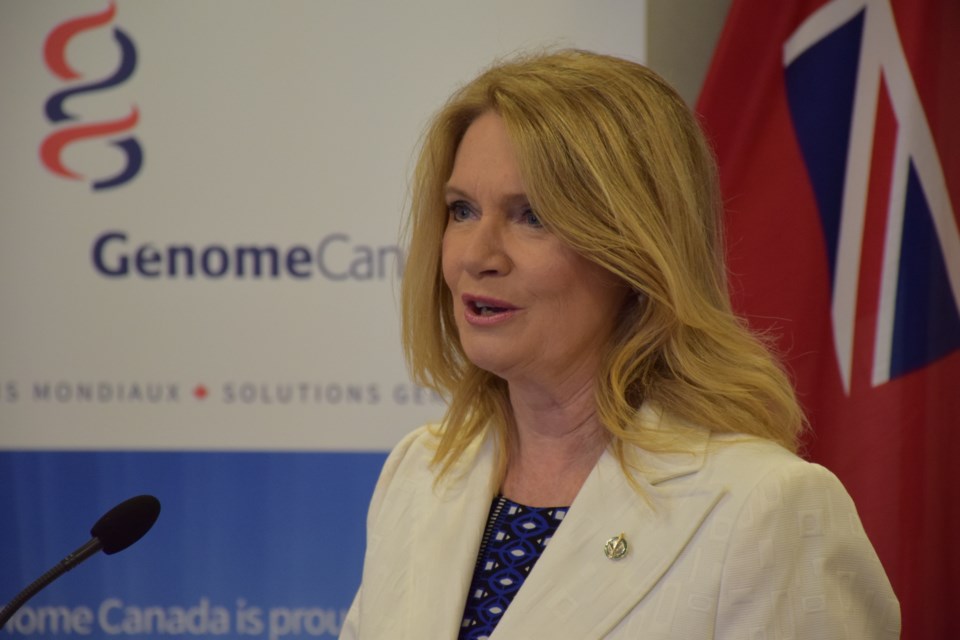Animal scientist Christine Baes heads a research project related to hybrid turkeys. Plant scientist Peter Pauls is pushing molecular and cellular biology to increase yields in canola. Food scientist Gisele LaPointe aims to ramp up the production of aged cheddar cheese.
These three leading edge University of Guelph scientists, their teams and laboratories, will share $10.7 million in genomics research funding. An announcement was held Friday morning in a dairy barn on campus. It was a modern barn, but still had a hint of barn smell.
Speakers at the event remarked that it was extraordinary that three of five genomics-based projects funded by Genome Canada’s Genomic Applications Partnership Program (GAPP) in this funding round went to U of G scientists.
A total of $17 million in funding was invested, about two-thirds going to U of G science. Of that money, $6 million came from Genome Canada, the remaining $11 million from the private sector and provincial governments.
Many speakers at the announcement praised the value of partnerships that bring government, the private sector and academe together to solve scientific challenges.
In simple terms, the genome is the entire DNA content present in one cell of an organism. Genomics is the branch of genetics aimed at sequencing and analyzing an organism’s genome.
Cindy Bell, executive vice-president of Genome Canada said during the announcement that genomics is about understanding the code of life. Cracking that code, she indicated, can unleash transformations in a host of areas, optimizing production in agriculture, forestry, fisheries and natural resource extraction, among others.
What scientists at U of G and elsewhere are doing is bridging the gap between advanced science and its application in the real world, she added.
GAPP supports university-industry research and development collaborations with social and economic benefits.
Kate Young, parliamentary secretary for science, made the announcement, joining officials from Genome Canada, Ontario Genomics, industry partners, government and university officials. There were about 60 people gathered in the barn.
The morning began with a tour of the nearby Agriculture Food Lab, where dignitaries got an up-close look at milk testing.
Young said it was unusual for three research projects from one university to receive funding. The federal government greatly values the extensive work being carried out at U of G to advance the science and application of genomics. The government, too, is committed to advancing the field, she added.
The science will spur growth in many sectors, growth that creates jobs and builds the economy, she added.
Guelph MPP Liz Sandals pointed out that U of G’s expertise in enhancing plant growth and animal breeding and health is longstanding, dating back about 100 years with the Ontario Agricultural College.
In a changing world with a rapidly growing population, disease resistant and higher yield crops, and greater growth efficiency in farm animals, will be vitally important, she indicated. U of G’s agricultural science benefits not only the health and quality of life of Ontarians and the agriculture/food industry in the province, but the entire world.
Baes research project is based in Kitchener, where she is studying ways to adapt the genomic science she developed to a variety of livestock species, including to improving health, welfare and productivity in turkeys.
Pauls is adapting genomics he developed along with molecular and cellular biologist Michael Emes and Ian Tetlow to improve canola crop productivity by 50 per cent over the next 10 years. The canola industry is a massive one in Canada, valued at over $19 billion annually.
LaPointe is U of G’s Dairy Farmers of Ontario professor of dairy microbiology. She aims to use genomics to improve manufacturing capacity for aged cheddar cheese, which could increase demand for Canadian milk significantly.
Guelph MP Lloyd Longfield said investments in science are critical, and the U of G investments will strengthen Canada’s position as a leader in agriculture and environmental sustainability. Growing more food on the same among of land, he indicated, is the right thing for the planet.
